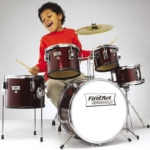We all know that it can be difficult at times to get your child to practice. In fact, it can be a downright daunting task in our lives! The most difficult part of it is finding that fine line between being able to motivate them with rewards and making practicing a chore that they don’t want to do. Rewards can be a bad idea, and they need to learn how to motivate themselves without a reward from you! Here are some motivational tips to help you get them excited about practicing!
Assess their readiness for music lessons
Kids develop the ability to concentrate at all different ages, so younger children may just not be ready yet. Once your child can really concentrate on practicing their violin for 15 minutes at a time, he/she may be ready for lessons. Here at the Omaha School of Music and Dance, we recommend that students be about 6 years old to start our Intro, or group, classes and private lessons.
Help them set practicing goals
Parents should help their children set and reach daily musical goals with their violin. This will give the child a sense of accomplishment and will make them feel good about their practice time. This will lead them to be more motivated about practicing and put more effort into their practice session.
Divide the week’s goals based on the teacher’s expectations into seven equal parts and make them understandable to your child. These goals should be worked on daily and should be based on building skills, such as playing scales or other string techniques. Goals set on their music they are learning can be more spread out over time. Do not bargain with them on the daily goals because that sets the standard that practice time is negotiable, and it should not be. Measure their progress everyday!
Setting goals holds the child more accountable for their learning then just telling them to practice for 15 minutes everyday. You can tell them to practice a piece of music until they can play it five times without making a mistake on the notes or to practice long bows until they can keep the bow straight three times in a row. Then make sure to get their feedback on how they did. Ask them questions like, “What is the hardest part of this song for you?” or “Can you play that on a different string?” or “What would that sound like slowed way down?”
Stay positive, even if the situation is not
Keep in mind that there will be good practice days and bad practice days. There will be times when you wonder why you choose the violin for your child to play, but remember that they can always come back and work on it tomorrow if things are just too tough today. Ultimately, you want them to enjoy playing their instrument, and that should be the goal.
Don’t let a tantrum from your child discourage either of you. These are normal, and needed for your child to learn how to problem-solve. The learning process is rarely a straight line and your child will learn that no problem is insurmountable. If they are having a rough day, let them just play around with the instrument and explore the sounds they can make with it. This will help get their creative juices flowing and will hopefully remind them why they wanted to play the violin in the first place.
Encourage them
It is your responsibility as a parent to encourage your child’s interests to continue growing with the violin by making your home a musical one. Play violin music from different periods in history for them to give them exposure to all genres of music. Make music a topic of conversation in your day. Take your young violinist to a live symphony concert so they can see professional violinist play. Maybe even help them to decorate their bedroom with musical posters and such. If you are excited about them playing the violin, they will be too!
Help them to look forward to practice time by making it like a fun game or activity for them. Have them take a “violin tour” around the house by playing a different song in each room. This can be done in your own house, or a grandparents’ or neighbor’s house as well.
Plan a recital for their stuffed animals and dolls, friends, and family. Create a program of songs they will perform for the guests and serve cookies afterwards.
Roll a dice to determine the amount of times a section of music will be practiced. You can also use a deck of cards for this “game.”
And finally, record a video of you child playing often to mark the progress they are making. It is good for them to see this as well as you!
If you are interested in taking violin lessons at OSMD, visit our website at www.omahaschoolofmusicanddance.com/violin-fiddle-viola-cello-lessons-omaha-ne/



